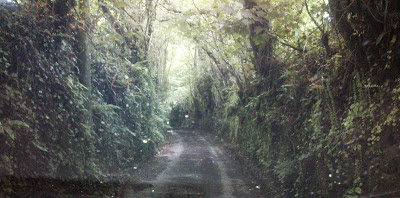I enjoy going to Chris's for our meat. Why? Because:
* His meat is all locally produced and slaughtered and prepared at the back of his shop. I have asked Chris where he gets his meat from and he's just pointed at a field across the way or a farm up the lane. We've never had a duff lot since we've been going to him.
* He, and his staff, are very friendly and always have time for a chat about whatever seems right to chat about on the day. Today it was clay pigeon shooting and growing potatoes.
* The journey there (it's about 5 miles from us) is through some beautiful countryside and there's always something to see as the seasons change.
At the moment the hedgerows are stunning with a spectacular display of foxgloves and cow parsley. And it's all so green, green, green.
* Caradon Town, itself, is an interesting place if you know its history: in the middle of nowhere if you don't. Nowadays it's no more than a few houses, a farm and the butcher's shop. It's hard to believe that, in the mid-1800s, it was at the centre of the mineral boom on Caradon Hill and the neighbourhood had a population of several thousand. Nowdays, there can't be many more than 50 or thereabouts people there.
* It's the only butcher's shop I know that comes with an associated mausoleum. Chris's father has been building a family mausoleum ever since we've been down here and it's finally finished. Four of its occupants, or rather their ashes, have already been installed inside. Given the robust health of Chris's dad, I think it's going to be a while before he joins them. It has to be said that Chris is not as keen on the mausoleum as his dad! He thinks his dad wants to keep on eye on him from beyond the grave.
* It's shopping with an old fashioned spin - going to an expert supplier and getting an expert service. With the added bonus of some very keen prices. Why do it any other way?
Compare and contrast with what would happen if we bought our meat at a supermarket. Walk up a sterile aisle, pick up a pre-pack, stick it in a trolley and wander off to the check-out. Boring! Boring!
 |
| The Rounsevell family mausoleum across the road from the butcher's at Caradon Town. |
 |
| The memorial on the outside wall of the mausoleum. Note that there is plenty of room for the names of those who are to follow. |
 |
| It's a good year for foxgloves in the hedgerows. We've got quite a selection down the sides of our own lane but no sign of the white ones I planted a couple of years ago. |













